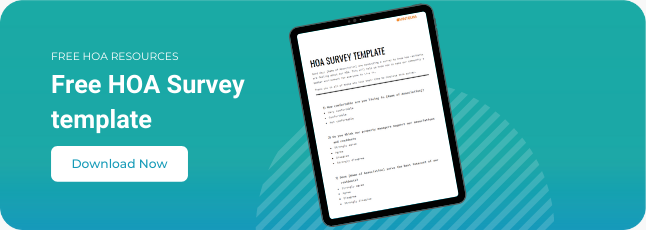There’s a general lack of training for the new HOA board members. While the budgets are often similar to that of a successful small business, there isn’t the training a new employee would get when they join a company. So, we are here to provide some training tips to help you in your new role.
1 – Understand the board and your role as an HOA board member
Let’s start with the basics. Understanding your role as a new HOA board member will make your work more effective and efficient. In essence, a board member’s job is safeguarding the interests of the homeowners and the association as a whole. To improve all residents’ quality of life and preserve the properties’ value. Let’s start by addressing the obvious question: What is an HOA board of directors?
Board President
The main governing body of an HOA is the board of directors, which a president leads. They should have first-hand knowledge of all the governing documents. The president should also have a strong moral compass to help make the right decisions. They need to have deep-rooted social and problem-solving skills and the ability to run the business part of the association. As they’re the ones leading the community, they should be a good community leader who set goals and solve conflicts. The president also needs to actively listen and respond to all feedback (good and bad) from both the board and the homeowners.
Vice President
Depending on the community, there might be a second in command in the form of a Vice President. They share most of the duties and responsibilities of the president. In the absence of the president, the VP will serve in the leading role as the acting President, making sure that all association business is run smoothly.
Secretary
The HOA Secretary will serve as the association historian, taking minutes of every meeting, maintaining records and protecting the association from liability lawsuits. This role is often overlooked but in reality, it’s essential to the association.
Treasurer
Last but not least we have the Treasurer, whose main responsibility is looking after the association’s financial stability. It’s their job to create the HOA’s budget for the year, and work with your accountant.
HOA Board Members
Whatever your role may be, remember that you’re part of a team and no one has absolute authority over the association’s affairs. You’ll have to work with your fellow board members and practice empathy and patience when dealing with homeowners, residents and even your own team members. If a resident asks something you don’t know, don’t panic. Just say you’ll get back to him/her with the information requested. No one knows everything at first, it’s just a matter of time before you become a great board member!
2 – Do your homework
The first thing you should do now that you’re on the board is to read and get familiar with the community’s governing documents. The vast majority of the questions residents will be asking you can be solved quickly if you know your way around the documents.
Master Deed
The first thing to read is the Declaration or Master Deed of the association, which includes the Covenants, Conditions & Restrictions or CC&Rs. These documents provide the basis of the rules governing everyone living in the community. You’ll have an easier time on the board when you get to know them.
Articles of Incorporation
After reading the Master Deed, you should become familiar with the Articles of Incorporation which form the legal basis on which the association is formed as an entity. It’s really important for you to read them thoroughly because it defines the functions of the board, the number of directors and in all, how the governing body of the community will be formed.
Bylaws
You’ll also want to read the association bylaws and all the rules and regulations set in place very carefully. The bylaws establish guidelines and rules on how the association operates, while the board sets and adopts the rules and regulations in accordance with the law. Remember that the legal requirements change depending on the state you live in.
3 – Understand the financials
As a board member, part of your job is to oversee the finances. It can be intimidating if you’re not familiar with accounting, insurance for HOAs or finances, but you can always ask the treasurer or property manager for help. One of the board’s main jobs is to ensure that the community’s cash flow, reserves, and budgets are all under control and on track.
Certified Public Accountant
If for some reason the board doesn’t feel comfortable with the finances, try scheduling an audit or hire a Certified Public Accountant (CPA). Even if the community is on track with its spending, an audit is always a good idea and can only help the board maintain the positive trend they’re on.
4 – Be careful not to bite off more than you can chew
When we get into a new role, often we want to do it all at once. Before you do this, take a step back and prioritize. You’ll have enough time to do everything, and doing too much can lead to bad decision making, stress, anxiety, and mistakes.
Remember that you’re a volunteer. It’s important to say no sometimes. This will help you avoid conflicts inside and outside your home, you are also part of the community and should enjoy it!
5 – Communicate with residents
Being transparent is crucial to maintaining a positive relationship between the board and the rest of the community. No one likes being kept in the dark, and this is especially true inside a homeowners’ association. The residents have a right to know what’s going on with the board, in the association, how the money is spent, and on what. It’s your job as part of the board to make this information available.
Community
Being transparent will also go a long way to help in creating a sense of community, for that to happen the board and the association must encourage open communication at all levels. That means feedback won’t always be what you want to hear. Criticism is always hard to swallow, but try your best to be receptive and listen carefully to others. Take notes on what they are saying, and pay attention to what residents praise or complain about. Try to understand them, both as neighbors and as a board member.
6 – Make meetings relevant and useful.
The board meetings are the way things get done in the community. It’s important for them to be as productive as possible. First never forget that you’re part of a team, and in a meeting every member of the board has the responsibility to be productive, polite and results-driven. This means preparing for the meeting beforehand, reading the agreed agenda and keep comments short and on point.
Meeting Chair
Designate a meeting chair or chairperson, this is someone who is charged with leading and sticking to the meeting agenda. He/she will also be responsible for stopping any irrelevant discussions before they derail the meeting. Remember that you and any board member has the authority to expel any person whose attitude or actions are going against the best interest of the board and the handling of the meeting.
Parliamentary Procedures
Another is to establish proper parliamentary procedures, this helps by implanting a clear structure on how the meetings are run. When the board makes a decision it embodies it in the form of a Motion that must be heard by all attendees and later on, made public. In every meeting, the secretary must keep minutes, which must be documented and stored for later reviewal.
End of a meeting
At the end of every meeting, the chairperson must read out loud the summary of all the decisions made and what the next steps are. Everyone should leave the meetings with a full understanding of everything that was discussed, agreed on and the next steps.
7 – Think long term
Think about what you want your community to become. You must have had ideas of what it could be when you campaigned for the board. Now it’s time to make them a reality with the help of your community, your team members and hard work you can transform your community for the better and maybe, if you feel like it, try running for a second term on the board.
What do residents think?
Take some time to talk to your fellow board members and neighbors and ask them about the future and what would they like to see happen inside the community in a year or two. Write down the ideas you find plausible and appealing and take them to the next board meeting to be discussed.
HOA Survey
To collect residents’ opinions, you could conduct an HOA survey. This is a great tool for you to leverage to collect understand HOA members’ needs. It promotes transparency and an inclusive community. You can do it with pen and paper, or use a free survey tool. Otherwise, you can use Neigbrs by Vinteum, which has a survey tool.
8 – Use the best resources available
In addition to all the advice and help you can get from your fellow HOA board members, homeowners and neighbors. You can always call prior board members and current committee chairs for an extra opinion. Having a second or even third opinion can help make a hard decision easier. Don’t forget that you’re not alone in this, everyone is in the same boat as you, and everyone in the community is interested in seeing it thrive, just like you.
As well as the resources above, there are plenty of high-quality online courses that may interest you. HOA training will always provide a positive impact and doing so with an organization that specializes in HOA education is the best way to learn.
Boardline Academy
At Boardline Academy you’ll learn from a specialized team made up of former community association managers, learning management system experts, attorneys and more. The academy has already trained thousands of board members with varying degrees of experience, turning them into a valuable asset for their communities. Boardline provides board members with professional-level training courses where you’ll learn to do everything we talked about in the article and much more! With their easy-to-use interface, your HOA training to become a great board member will be a breeze.
YouTube
There are lots of Continuing Education classes available on YouTube. Our channel has a variety of videos that cover roof coatings, asphalt, project planning, paint and more. These help new HOA board members learn more about the industry.
Set Your HOA Board Up for Success with Neigbrs by Vinteum!
Stepping into an HOA board role can be overwhelming, but Neigbrs by Vinteum makes it easier. Our software helps new board members stay organized, improve communication, and manage community responsibilities efficiently.
Want to make HOA management stress-free? Request a Free Demo today!

Conclusion: New HOA Board Members
New HOA board members have a lot to learn to efficiently manage their community association. These 8 tips will help you become a more effective board member, to better serve your community.
To make your life easier, you can use communication and management software for HOAs. This will reduce repetitive manual processes, and improve communication with residents.







0 Responses